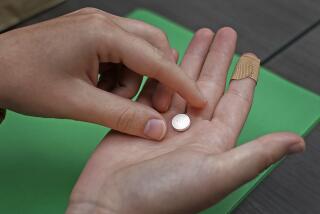Supplements May Help Women Conceive
Female fertility can be a mysterious business. No matter how carefully a woman tracks her ovulation or times her romantic encounters, there’s no guarantee that a baby will be on the way.
Women who have trouble conceiving get lots of free advice: Relax, take a cruise, try different intercourse positions, etc. But could the solution lie in a supplement? Two companies promise to boost female fertility through blends of herbs, vitamins, minerals and other nutrients.
The ingredient list for FertilityBlend for Women, manufactured by Daily Wellness Inc., includes the herb chasteberry (Vitex agnus-castus) along with the amino acid L-arginine, green tea, B vitamins, vitamin E, folic acid, iron and zinc. Women are instructed to take three capsules daily for three to six months. A three-month supply costs $74.99 through the company website; a six-month supply can be had for $129.99.
FertilAid for Women, a supplement from Fairhaven Health, also contains chasteberry and every nutrient found in FertilityBlend except for L-arginine. It also throws in extras such as ginkgo, ginseng and vitamins C and D. Users are instructed to take three capsules a day for at least three months. The company’s website sells a three-month supply for $77.95
FertilityBlend and FertilAid both offer different formulations for men.
The claims: FertilityBlend’s website says the supplements have “helped hundreds of thousands of couples safely and naturally improve their fertility health.” It also claims to be “clinically validated by a study done at Stanford University School of Medicine.”
FertilAid’s website says that supplement “promotes reproductive wellness, supports fertility and optimizes your chances to conceive.” The site goes on to say that the product for women will “restore female hormonal balance” and “promote regular ovulation.”
The bottom line: There’s no doubt that good nutrition can help boost fertility, and there’s also good reason to believe that fertility supplements could help some woman conceive, says Dr. Lynn Westphal, an associate professor of obstetrics and gynecology at Stanford University School of Medicine.
Westphal was the lead author of a 2006 study of FertilityBlend. (A researcher with Daily Wellness co-authored the study, but Westphal herself has no ties to the company.) The study included 93 women who had previously tried to conceive for at least six months without success.
Fifty-three of the women took three capsules of FertilityBlend every day, and the rest took a placebo. After three months, 14 of the 53 women taking FertilityBlend had become pregnant, a success rate of 26%. Meanwhile four out of 40 -- only 10% -- of the women taking a placebo conceived.
The study also found that women who took FertilityBlend produced more progesterone, a hormone that encourages fertilization and prepares the uterus for pregnancy.
According to Westphal, FertilityBlend might be worth a try, especially for younger women with irregular periods. “You could take it in place of a prenatal vitamin,” she says.
Still, the baby-making powers of fertility supplements are far from certain, says Cathi Dennehy, an associate professor in the Department of Clinical Pharmacy at the UC San Francisco School of Medicine. The FertilityBlend study was relatively small, she says, and there just isn’t a whole lot of other evidence that it really does the job. And since there have been no published studies of FertilAid, its effectiveness is even more of an open question, she adds.
According to Dennehy, the extra vitamin C in FertilAid could theoretically be helpful for some women. At least one study has suggested that the antioxidant vitamin can improve fertility in women with luteal phase defect, a type of mistimed cycle that’s a common cause of infertility.
Westphal suspects chasteberry is the key ingredient in FertilityBlend. European studies suggest that the herb can help encourage a baby-friendly blend of hormones without serious side effects.
Clearly, many couples will need more serious help than can ever come from a supplement, Westphal says. “Women who are over 35 and have been trying for at least six months should not try this in place of seeing a physician,” she explains.
Somewhat surprisingly, the president of Daily Wellness, Denny Kwok, completely agrees. Women in their late 30s or 40s should definitely see a doctor before trying his product, he says. “It would be disingenuous of us to say that it works for everyone,” he explains. “The clock is ticking, and we don’t want anyone to miss their chance.”
More to Read
The biggest entertainment stories
Get our big stories about Hollywood, film, television, music, arts, culture and more right in your inbox as soon as they publish.
You may occasionally receive promotional content from the Los Angeles Times.






